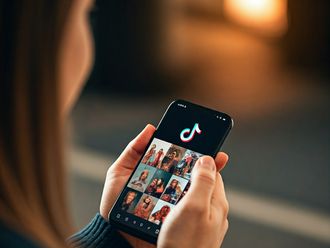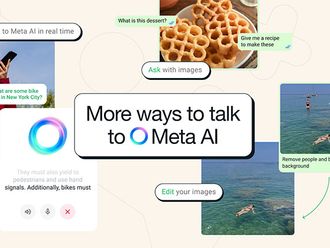
Artificial intelligence chatbots aren't hard to use. But in my experience, and maybe yours, chatbots are hard to use well.
Effectively using ChatGPT, Bing AI or Google's Bard is like learning a language with unintuitive quirks.
My colleague Will Oremus spent many months trying, failing and trying again to use ChatGPT to help him summarize information, brainstorm and write.
Try for yourself to see what happens when you apply a few chatbot tweaks, such as feeding ChatGPT personal details about your friend to draft a wedding toast.
Will said one key lesson he learned from his research and experiments is to change (or lower) our expectations for AI chatbots.
ChatGPT is less like a Magic 8 Ball that spits out a perfect answer and more like a brainstorming partner who is tireless but not very smart.
I spoke to Will to identify these do's and don'ts for how you can get the most from AI chatbots.
Don't use chatbots for factual answers
Google and Wikipedia aren't perfect, but they're good enough for reliable factual information most of the time.
"That's not what we're talking about with chatbots at this stage," Will said. "We're talking about whole swaths of questions where the AI will get it wildly wrong."
Paraphrasing the programmer Simon Willison, Will said AI chatbots give you the average or typical response from information the software has ingested from gazillions of websites. That average might be correct - or stupendously wrong.
And if the chatbot doesn't know the answer to "What is Shira Ovide's favorite food?" it might invent a plausible sounding answer.
For questions with a known answer - the height of the Washington Monument or the biography of German Chancellor Olaf Scholz - use Google or Wikipedia and not ChatGPT.
Do use chatbots to help you brainstorm
When Will was planning an 8th birthday party for his kid, he typed into ChatGPT for help with the invitation - but not to write a draft.
Will knew that the AI had sucked up a bunch of children's party invitations from the internet. He wanted a glimpse at what all those party-throwing parents had done before.
One of the ChatGPT-suggested invitation wording said something like, come to the party, there will be games, cake and prizes. "And I thought, 'People do prizes for birthday parties?'" Will said. (Yes, they do.)
Will said because chatbots have a vast storehouse of people's past writing online, he's started using ChatGPT to learn what other people have done before for parties, soccer practice planning and more.
Don't ask a chatbot once and stop
Chatbot experts know that the first response when you type, "How can I talk to my 8-year-old to convince her to brush her teeth?" may be generic and unhelpful.
But Will said if you keep going back and forth, ChatGPT might land on something that sparks an idea.
"You never sit down expecting to type in your prompt, get the response and you're done," Will said. "It should always be regarded as an iterative process."
When I asked for kiddo brushing persuasion, the free, publicly available version of ChatGPT offered 12 suggestions. One of them was to tell your child a fun story about a "tooth superhero" who uses brushing to defeat monsters.
I typed a follow-up question: "What's a story I can tell about tooth superheroes?"
The next chatbot responses suggested a character called "Flora the Flosser." They weren't great, but they weren't bad.
I went back again and asked ChatGPT to make the story about a unicorn. The software spit back "Rinsewind the Rainbow Rinser," a unicorn whose rainbow rinses were a shield of protection for teeth.
ChatGPT can suggest loads of (mostly terrible) ideas. Somewhere in there might be a germ of a good idea that you can run with.
That should be your expectation for ChatGPT, Will said.
He quoted a line from a 1990s Gin Blossoms song: "If you don't expect too much from me, you might not be let down."
Do know what chatbots are best at
Chatbots can be amazing at explaining complicated topics like cryptocurrency as though you're 5 years old.
To understand this strength, it helps to know that the software has been fed archives from Reddit, including a forum called "Explain Like I'm Five."
Similarly, there are loads of recipes on the internet. That makes ChatGPT good (but imperfect) at personalized recipe planning.
When I typed into ChatGPT, "Suggest seven dinner options that use many legumes and lentils and can be prepared ahead of time," I thought the options were solid.
They included a chickpea salad with diced peppers, tomatoes and red onions with a lemon vinaigrette.
I asked ChatGPT to "make me a shopping list with ingredients for the first four dishes" that the AI had spit out. And it did.
But because chatbots mash together bits of online information in sometimes nonsense ways, you shouldn't rely on AI recipe steps.
A chatbot might skip an essential ingredient or tell you a dish is gluten-free when it's not.
Again, you should treat ChatGPT less as a reliable cookbook and more as a meal-planning brainstorming partner.
Don't get frustrated and give up
I've been disappointed when I've tried AI chatbots. The experiences made me reluctant to spend time learning to make the technology work for me.
For example, I asked ChatGPT and Bing's AI to come up with an itinerary for my New Jersey beach vacation last spring. The suggestions were either obvious or so unlike me that I would have laughed at a friend who made the same recommendations.
Will said that while chatbots are far from perfect and not great at everything, they are worth an investment of your time.
He said the five minutes of travel planning with ChatGPT could have popped up some ideas for me to research further.
That doesn't make AI the magical personalized travel planner that I want, but it's something.


_resources1_16a30b3fb8b_small.jpg)




